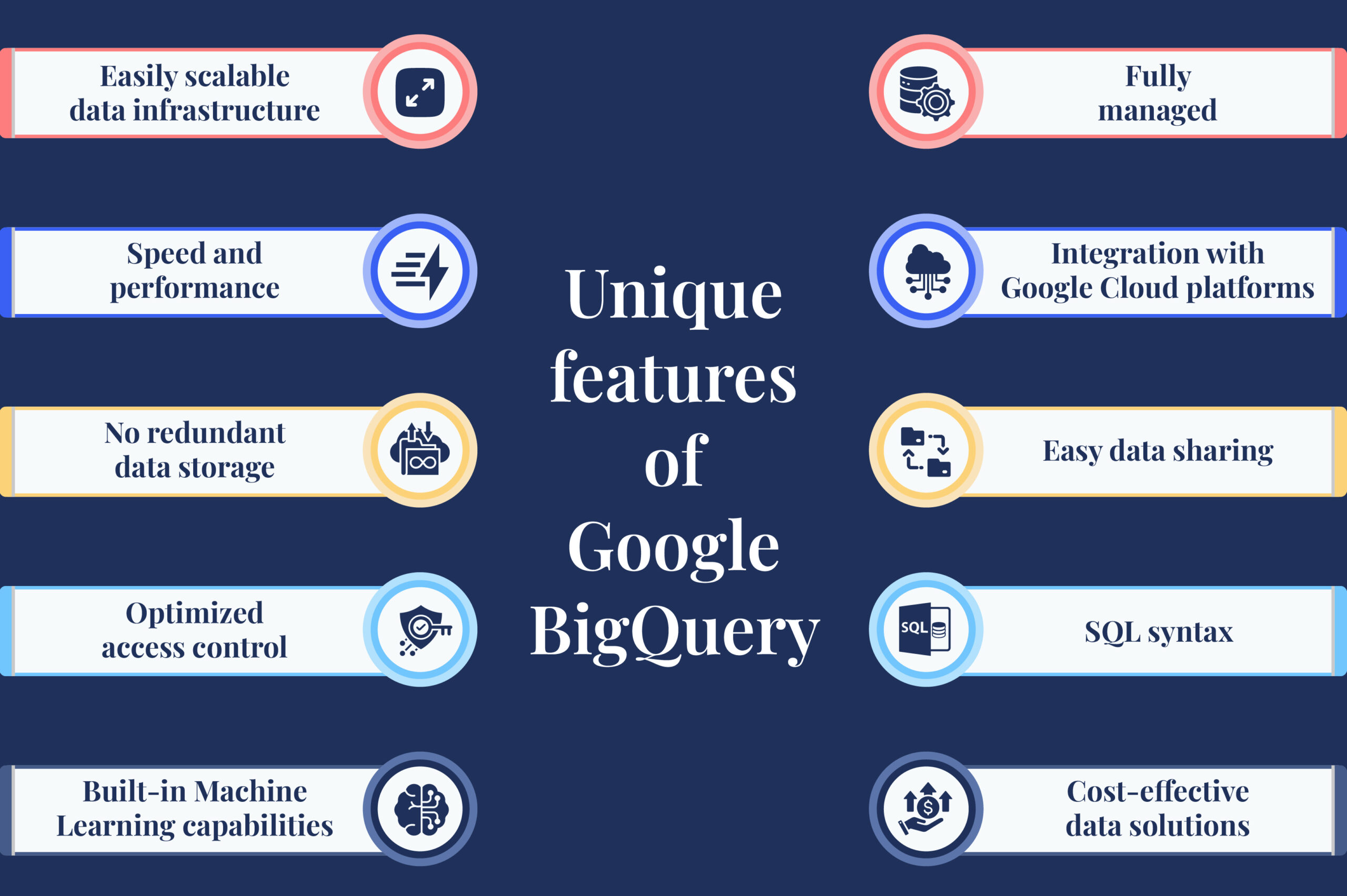Top Reasons for Data Engineers to Choose Google Bigquery

Table of Contents:
Introduction
Have you ever had a massive amount of data and took days/weeks to get insights, and that, too, not absolute? Developers and data analysts often face difficulties such as these. This affects the overall company’s data-driven decision-making. Manual processing of such extensive datasets is not only impractical but also highly labor-intensive.
As companies increasingly seek real-time and accurate insights, the demand for reliable, highly scalable, and user-friendly systems with data security becomes more pronounced. This growing need stresses the importance of advanced data warehouses.
As an advanced data analytics solutions provider in New York and New Jersey, we have tried and tested various data warehouse solutions.
In this blog, we will discuss a hot topic among data engineers worldwide and a data warehouse solution that we recommend — Google BigQuery. We will explain – what it is and why it’s generating so much interest and excitement in the field of data management.
Read through to the end of the blog for exclusive tips on unlocking the true potential of BigQuery.
What is Big Query?
Big Query is a data warehouse solution offered by Google. The most straightforward definition comes from Google itself: ‘BigQuery is Google’s fully managed and completely serverless enterprise data warehouse, where you can store and analyze your data easily.’
What does a serverless warehouse mean?
To understand a serverless system, let’s first understand a server. A server is a type of computer that provides services or resources to other computers over a network. Think of it as a central hub or a powerful helper that manages and shares information.
A serverless system means you won’t have to manage the underlying data infrastructure. In terms of Google BigQuery, “serverless” means Google handles all the technical details, including scaling, maintenance, and security. This allows you to focus solely on querying and analyzing your data.
Sounds intriguing, doesn’t it? Besides serverless infrastructure, BigQuery offers a host of features that make it especially attractive to data engineers. Keep reading to discover its unique features.
Unique features of Google BigQuery that make Data engineers love it

- Easily scalable data infrastructure: Data engineers usually face one major issue of data input, which means that data storage and computation can become problematic as data increases over time. Serverless architecture, elastic scaling, and distinct data storage and computation allow easy scaling.
- Fully managed: A fully managed system means the provider takes care of all operational aspects. As a data engineer, you can simply log into your Google Cloud project and get started. This user-friendly interface, along with an array of data integration tools, enhances workflow and boosts productivity, enabling teams to focus on delivering results rather than managing complex systems.
- Speed and performance: BigQuery features real-time data processing and a high-speed streaming insertion API, which means real-time data analysis. Also, the most significant advantage is its lightning-fast analytics database. In fact, you can set up a data warehouse in seconds with BigQuery and query data as soon as the warehouse is set up.
- Integration with Google cloud platforms: Google BigQuery allows data upload directly from Cloud or stream data from Cloud Dataflow. Data engineers can also use cloud data fusion to build data pipelines.
- No redundant data storage: BigQuery is designed to handle massive data. It is well connected with Google’s data ecosystem, so data storage is not limited. Building a data lake is also made simple and fast with BigQuery.
- Easy data sharing with optimized access control: Google BigQuery is integrated with Google Cloud’s access management along with real-time data processing. This feature makes it easier for data engineers to give permission to specific teams or protect sensitive data, enhancing data security. Moreover, you can import data in a variety of formats.
- SQL syntax: Data engineers often come from backgrounds that include SQL, and BigQuery leverages standard SQL syntax. This familiarity makes it easy for data engineers to transition to BigQuery and start working with it right away. They can write powerful queries to extract, transform, and analyze data without needing to learn a new language.
- Built-in machine learning capabilities: With BigQuery ML, data engineers can create and execute machine learning models directly within BigQuery using standard SQL. This feature empowers data engineers to leverage their existing SQL skills to build predictive models without needing extensive knowledge of machine learning frameworks.
- Cost-effective data solutions: In Google BigQuery, you only get charged for the resources you use. You can select on-demand pricing or flat-rate pricing for predictable workloads. BigQuery also offers a sandbox that gives you free access to try out BigQuery and use the UI without providing a credit card or using a billing account.
Conclusion:
Data engineering with BigQuery is a desirable option for data engineers (seasoned data professionals or just starting their journey) because billions of data can be processed easily.
Google BigQuery’s real-time data processing capabilities, cost efficiency, scalability, and machine learning integration make it a favorite among data engineers. As the data landscape continues to evolve, BigQuery stands out as a reliable and innovative solution that meets the needs of today’s data engineers.
As business intelligence services in the USA, our team of expert data engineers allows us to deliver powerful, efficient, and secure data solutions tailored to our clients’ needs. By leveraging BigQuery’s strengths, we can optimize data workflows, drive insights, and support strategic decision-making.
Contact us to unlock the full potential of your data with our advanced data analytics solutions.
